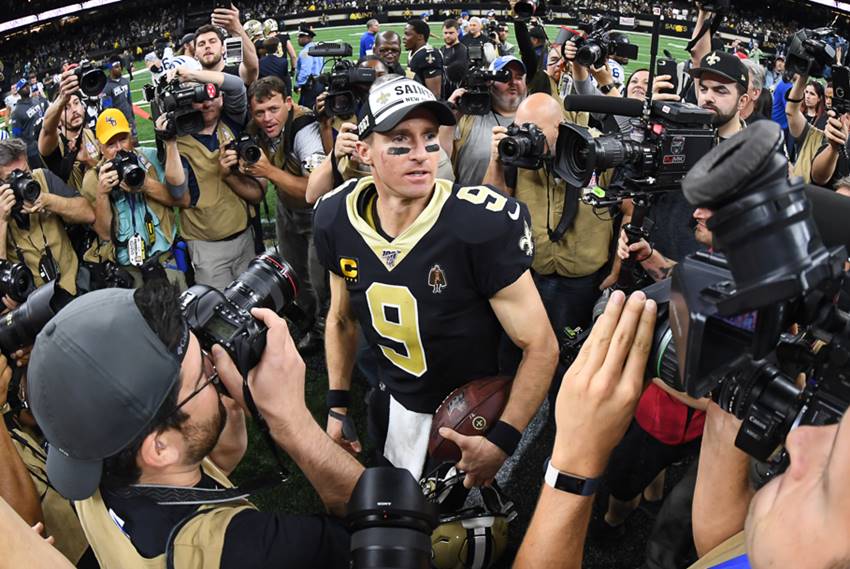We can’t measure how much better off the Saints and New Orleans are because of Drew Brees

Drew Brees arrived in New Orleans needing his new team and city as much as they needed him.
Fifteen years later, it’s impossible to measure how much better off all of them are because of the union.
In 2006, like his new city, Brees was battered but recovering, already on his way back through daily work and a determination to be better than ever.
It was less than seven months after Hurricane Katrina ripped through New Orleans, crushing faulty levees and submerging most of the city.
The Saints had recently returned from a Katrina-induced displacement to San Antonio. They had fired head coach Jim Haslett and his staff and replaced him with a young Dallas assistant named Sean Payton.
They were trying to recruit new players to a community still in the early first quarter of a lengthy rebuilding process.
Brees really had nowhere else to go. His recent shoulder surgery had scared off the Miami Dolphins, just as the boarded-up windows, blue-tarp roofs and ghost-town feel would give pause to other free agents.
But Brees happily signed with the Saints and Payton happily handed him the keys to the team’s offense – and off we all went.
Thus began the most successful 15-year run in Saints history, led by Payton and Brees.
It ended Sunday when Brees, who turned 42 last month, officially announced his retirement on the 15th anniversary of the day he joined New Orleans.
It was generally expected that 2020 would be Brees’ last season after he very nearly retired in the wake of the 2019 season, gave no indication that his return was likely to span more than one season and suffered 11 fractured ribs, a punctured lung and apparently other injuries during last season.
So the announcement wasn’t a surprise, it was even expected.
But the official end to Brees’ career was jolting nonetheless.
The 2021 Saints season will feature someone other than Brees at quarterback. It remains to be seen who his successor will be, but for now it’s enough of a challenge to process that it will be someone other than Brees who will be in charge of the fortunes of New Orleans’ NFL team.
Drew Brees was the best Saints player ever, the most significant professional athlete ever to represent a franchise in New Orleans.
That first post-Katrina season ended with Brees leading the Saints to the NFC Championship Game for the first time. They lost to the Bears in Chicago, but the improbable run signaled that life post-Katrina was getting better and might even exceed pre-Katrina life in some ways.
Certainly the post-Katrina (and more to the point, post-Brees arrival) Saints were going to be vastly different than their predecessors.
The Saints missed the playoffs the next season with a 7-9 record, a mark that remarkably would represent the franchise’s floor during the Brees era.
There have been a few other departures from New Orleans by other Saints that produced difficult, emotional estrangements that we all dreaded.
Danny Abramowicz was traded to the 49ers. Archie Manning was traded to the Houston Oilers. (Damn, that one still stings.)
Rickey Jackson left, though the sting from that one was mitigated when the City Champ won a Super Bowl ring in San Francisco that he was not going to win in New Orleans.
Saying goodbye to Bobby Hebert, Sam Mills, Morten Andersen and William Roaf was no walk in the park either.
But this is different. This is unique.
Not just because the aforementioned departures were due to trades or free agency and that Brees is retiring.
As good – no, great – as Roaf, Andersen, Mills, Hebert, Jackson, Manning and Abramowicz, and others, were, their Saints teams never came close to reaching the heights that Brees’ teams reached.
Their departures, though sad, didn’t elicit the feelings of dread that Brees’ retirement – and in fact the long anticipation of it – has elicited.
There is an inescapable concern that the Saints going forward will inevitably be less successful than they were doing his tenure, though it’s equally inescapable that Payton has shown he deserves the benefit of the doubt in regards to keeping the Saints among the more successful teams in the NFL even without Brees.
But the feeling of loss is greater than that of a guaranteed Hall of Fame quarterback.
New Orleans is losing someone whose impact on the community transcends his ability to complete passes, lead a team and turn seemingly inevitable defeat into improbable victory.
When so many families were forced to leave New Orleans because of Katrina, when many of them couldn’t or chose not to return, Brees and his wife Brittany moved to New Orleans.
They have four children who were born as New Orleanians.
Brees, his wife and his foundation have donated millions of dollars to the betterment of New Orleans.
The quarterback’s impact on the Crescent City transcends football and has made him a uniquely impactful citizen.
Brees’ influence on New Orleans, its football team and its psyche has been far greater than anyone could have imagined 15 years ago Sunday.
Drew Brees is leaving the Saints a better franchise and New Orleans a better place than he found them.
Neither is a coincidence.
- < PREV Drew Brees joining NBC Sports as football analyst
- NEXT > Jordan claims Southland Special Teams Player of the Week honors
Les East
CCS/SDS/Field Level Media
Les East is a nationally renowned freelance journalist. The New Orleans area native’s blog on SportsNOLA.com was named “Best Sports Blog” in 2016 by the Press Club of New Orleans. For 2013 he was named top sports columnist in the United States by the Society of Professional Journalists. He has since become a valued contributor for CCS. The Jesuit High…





